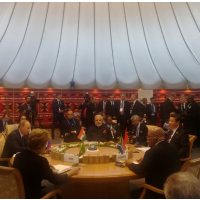Modi Pushes BRICS Towards Further Cooperation
 The leaders of the BRICS meet in Ufa, Russia (photo: MEA/Twitter)
The leaders of the BRICS meet in Ufa, Russia (photo: MEA/Twitter)
The group of emerging economies known as BRICS – Brazil, Russia, India, China and South Africa – are as different in their values as they are in their economic growth. The informal club has in the past decade largely spent its time challenging the developed world.
The time has now come for closer cooperation and coordination, according to Prime Minister Narendra Modi, who proposed a 10-point initiative at the ongoing BRICS summit at Ufa, Russia.
Calling it 'Das Kadam: Ten Steps for the Future', he proposed that India host the first BRICS trade fair and the group should establish research centres for railways and agriculture.
Modi said “its important to have consensus, collaboration and cooperation between all major nations”, given “the challenges that the world is faced with”.
His proposals also include cooperation between national audit institutions as well as cities in the field of urbanisation, and the setting up of a BRICS sports council, an annual sports meet and a film festival. Modi also called for the first major project of the BRICS’ New Development Bank to be in field of clean energy.
"Also, every country should obey international rules and norms," the prime minister said, a point that was perhaps not lost on fellow BRICS leaders Russian President Vladimir Putin and Chinese President Xi Jinping.
India will be the next chair of BRICS for 11 months beginning February 2016.
- Karan Singh
To Learn More:
Ten Steps for the Future: PM Narendra Modi's 10-point initiative for BRICS nations (PTI)
Distrust, trade barriers obstacles in Eurasia development: PM Modi (PTI)
Brics nations’ differences on display as club stages summit (by Kathrin Hille, Joe Leahy and Andrew England, Financial Times)
- Top Stories
- Controversies
- Where is the Money Going?
- India and the World
- Appointments and Resignations
- Unusual News
- Latest News
- India College Chain’s Expansion into U.S. Draws Opposition from Massachusetts Officials over Quality of Education
- Milk Shortages in India Tied to Release of New Movies Featuring Nation’s Favorite Stars
- Confusion Swirls around Kashmir Newspaper Ban in Wake of Violent Street Protests
- Polio-Free for 5 Years, India Launches Vaccine Drive after Polio Strain Discovery
- New Aviation Policy Could Increase Service, Lower Ticket Prices






Comments